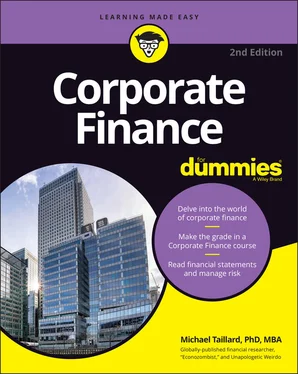Michael Taillard - Corporate Finance For Dummies
Здесь есть возможность читать онлайн «Michael Taillard - Corporate Finance For Dummies» — ознакомительный отрывок электронной книги совершенно бесплатно, а после прочтения отрывка купить полную версию. В некоторых случаях можно слушать аудио, скачать через торрент в формате fb2 и присутствует краткое содержание. Жанр: unrecognised, на английском языке. Описание произведения, (предисловие) а так же отзывы посетителей доступны на портале библиотеки ЛибКат.
- Название:Corporate Finance For Dummies
- Автор:
- Жанр:
- Год:неизвестен
- ISBN:нет данных
- Рейтинг книги:4.5 / 5. Голосов: 2
-
Избранное:Добавить в избранное
- Отзывы:
-
Ваша оценка:
- 100
- 1
- 2
- 3
- 4
- 5
Corporate Finance For Dummies: краткое содержание, описание и аннотация
Предлагаем к чтению аннотацию, описание, краткое содержание или предисловие (зависит от того, что написал сам автор книги «Corporate Finance For Dummies»). Если вы не нашли необходимую информацию о книге — напишите в комментариях, мы постараемся отыскать её.
Corporate Finance For Dummies,
Corporate Finance For Dummies,
Corporate Finance For Dummies — читать онлайн ознакомительный отрывок
Ниже представлен текст книги, разбитый по страницам. Система сохранения места последней прочитанной страницы, позволяет с удобством читать онлайн бесплатно книгу «Corporate Finance For Dummies», без необходимости каждый раз заново искать на чём Вы остановились. Поставьте закладку, и сможете в любой момент перейти на страницу, на которой закончили чтение.
Интервал:
Закладка:
Broker-dealers are organizations that do a combination of both of these services. They perform pretty much all the middle-man functions of providing securities services to corporations and individuals alike, and they’ve all but eliminated the need for organizations that specialize in either broker or dealer services.A special type of broker, called a discount broker, performs similar functions as broker-dealers, except that they only perform the transactions, while broker-dealers often provide assistance by offering advice, analysis, and other services that can help their customers make investment decisions. Discount brokers don’t perform these additional services.
Underwriters
A special type of insurance company, called underwriters, deals only with other insurance companies. They analyze applications for insurance, determine the degree of risk and associated costs with issuing insurance, and determine eligibility and price. Some insurance companies have their own internal underwriting departments, while others outsource to external companies that specialize in just underwriting.
Banking underwriters are slightly different in that they assess the risk and potential of loan applicants to pay back their loans. They assist banks in determining what interest rate to charge and whether applicants are even eligible for a loan.
Securities underwriters assess the value of a particular organization or other asset for which securities are being issued. In other words, if a company wanted to become a corporation, one step in that process is to determine the value of the company, the number of shares to issue, and the amount of money the company is liable to raise and to help with the distribution and sale of the original shares of stock to raise money for the company to become a corporation.
Funds
During the early days of the Christian church and then again in the United States in the 1960s, groups often pooled all their assets together and allowed them to be managed for the good of the group. Funds are basically the free-market-investor version of this collective idea. Individuals pool their money together in a fund, that money is managed as a single investment portfolio, and the individuals who contributed to that portfolio (the fund) receive returns on their investments proportional to their ownership in the returns generated by the entire portfolio.
 The point of pooling assets is to make professional investments and investing strategies available to people who otherwise wouldn’t have the resources on their own to pursue such investments. Funds are popular options for corporations to provide for the retirement funds of their employees, but corporations themselves also frequently trust their investment management to a fund. Generally speaking, each fund has its own investing strategy, so investors choosing between funds must pick one that has a strategy they believe will most benefit them.
The point of pooling assets is to make professional investments and investing strategies available to people who otherwise wouldn’t have the resources on their own to pursue such investments. Funds are popular options for corporations to provide for the retirement funds of their employees, but corporations themselves also frequently trust their investment management to a fund. Generally speaking, each fund has its own investing strategy, so investors choosing between funds must pick one that has a strategy they believe will most benefit them.
Funds come in two types — hedge funds and mutual funds — and although they both have the same fundamental principles, each type has some unique traits, processes, regulations, and variations. Table 2-1gives you a quick look at the main differences.
TABLE 2-1Differences between Hedge Funds and Mutual Funds
| Hedge Funds | Mutual Funds | |
|---|---|---|
| Strategy | Managers have more freedom in their use of investment tools and an ability to change strategy as they see fit. | Managers must adhere strictly to the strategy described when the fund was established and must choose from a rather limited range of investment types. |
| Fees | Hedge funds typically charge a fee based on the performance of the fund; the better the fund performs in the market, the more the investors pay in fees. | Mutual funds are highly regulated in terms of the amount they can charge in fees and the types of fees they can charge. (For instance, 12b-1 fees are those related to the administrative functions of the fund and are capped by the Securities and Exchange Commission.) |
| Shares | Hedge funds pool the assets of the investors collectively and invest them. | Mutual funds sell shares of a pool, which is either indefinite, meaning that there are no restrictions on the number of shares issued and that the fund buys back shares as they are sold by investors, or traded like stocks, depending on whether the mutual fund is open-end or closed-end, respectively. |
Financing institutions
Financing institutions are kind of like banks in that they lend money, but they’re a bit different, too. First of all, they tend to give different types of loans than banks do. Secondly, they get their funding by borrowing it themselves instead of through deposits. They earn a profit by charging you higher interest rates than they’re paying on their own loans.
Sales financing institutions
If you’ve been to a car dealership, furniture store, jewelry store, or some other retailer that deals in expensive merchandise, odds are you’ve been offered a loan that you can use to purchase an item immediately and then pay off the loan in installments. The store itself isn’t offering you the loan; a type of financing institution called a sales financing institution works with the store to give you the loan. Sales financing institutions work with both individuals and companies making large purchases.
Personal credit institutions
Personal credit institutions are companies that offer small personal loans and credit cards to individuals. Because they don’t have much to do with corporate finance — unless the personal credit institution itself is a corporation or you’re using your personal line of credit to invest in a corporation (in which case, as long as your returns exceed the interest you’re paying, then good for you) — I don’t cover this topic in detail here or elsewhere in this book.
Business credit institutions
Did you know that corporations can get credit cards and credit loans just as you can? Well, they can, and those credit loans come from a type of financing institution called a business credit institution. Business credit loans differ from standard business loans in that they’re a running line of credit in the same way that your credit card is a running line of credit. These loans can be freely increased or gradually paid off within certain limits as long as the corporation makes periodic minimum payments on the balance.
 A special type of business credit institution, called a captive financing company, is a company that’s owned by another organization and that handles the financing and credit only for that organization rather than for any applicants. For example, GMAC, the financing arm of General Motors, which changed its name to Ally Bank, is the captive credit financing company for the corporation General Motors.
A special type of business credit institution, called a captive financing company, is a company that’s owned by another organization and that handles the financing and credit only for that organization rather than for any applicants. For example, GMAC, the financing arm of General Motors, which changed its name to Ally Bank, is the captive credit financing company for the corporation General Motors.
Loan sharks and subprime lenders
All the lending I talk about in this chapter has been at the prime rate, which is the interest rate charged to customers who are considered to be of little or no risk of defaulting. In the United States, the prime rate is about 3 percent above the interest rate that banks charge each other, called the federal funds rate. (Some nations use LIBOR, which is the London Interbank Offered Rate.) For those corporations and people who are considered higher risk, they will often qualify for only loans considered subprime, which are offered at interest rates higher than the prime rate.
Читать дальшеИнтервал:
Закладка:
Похожие книги на «Corporate Finance For Dummies»
Представляем Вашему вниманию похожие книги на «Corporate Finance For Dummies» списком для выбора. Мы отобрали схожую по названию и смыслу литературу в надежде предоставить читателям больше вариантов отыскать новые, интересные, ещё непрочитанные произведения.
Обсуждение, отзывы о книге «Corporate Finance For Dummies» и просто собственные мнения читателей. Оставьте ваши комментарии, напишите, что Вы думаете о произведении, его смысле или главных героях. Укажите что конкретно понравилось, а что нет, и почему Вы так считаете.












